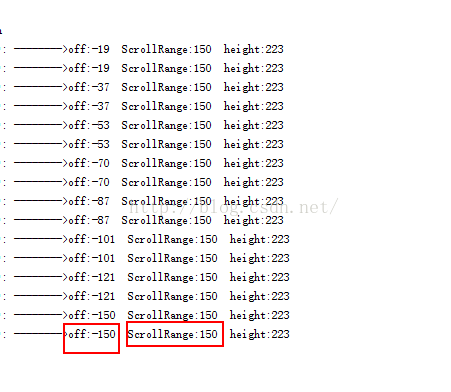Reprint: https://blog.csdn.net/axuanqq/article/details/51144295
if (appBarLayout != null)
appBarLayout.addOnOffsetChangedListener(this); @Override
public void onOffsetChanged(AppBarLayout appBarLayout, int i) {
super.onOffsetChanged(appBarLayout, i);
if (srlLayout == null) return;
srlLayout.setEnabled(i >= 0||isSlideToBottom(recyclerview) ? true : false);
} i> = 0 indicates that appBarLayout is fully displayed: the touch event that can refresh the control needs to be enabled = true;
For the isSlideToBottom method, please See Monitor at bottom of recyclerview scrolling
When recyclerView scrolls to the bottom, the touch event enable=true of the refresh control needs to be enabled;
Mask the scope of refresh control: when appBarLayout is scrolling, the recylerView does not scroll to the bottom
There is another way to achieve this:
@Override
public void onOffsetChanged(AppBarLayout appBarLayout, int i) {
super.onOffsetChanged(appBarLayout, i);
LogUtils.d("-------->off:" + i + " ScrollRange:" + appBarLayout.getTotalScrollRange() + " height:" + appBarLayout.getHeight());
} 
It can be observed that I > = 0 means appBarLaoyut is fully open
When i==-appBarLayout.getTotalScrollRange(), it means that appBarLayout is completely closed or folded
So: i==-appBarLayout.getTotalScrollRange() can also be judged and distributed to the refresh control
A tool class is given by the way:
<pre name="code" class="java">
import android.support.design.widget.AppBarLayout;
import android.support.v7.widget.RecyclerView;
/**
* @author xuanyouwu
* @email xuanyouwu@163.com
* @time 2016-04-13 16:25
*/
public class DesignViewUtils {
/**
* AppBarLayout Full open
*
* @param verticalOffset
* @return
*/
public static boolean isAppBarLayoutOpen(int verticalOffset) {
return verticalOffset >= 0;
}
/**
* AppBarLayout Closed or folded
*
* @param appBarLayout
* @param verticalOffset
* @return
*/
public static boolean isAppBarLayoutClose(AppBarLayout appBarLayout, int verticalOffset) {
return appBarLayout.getTotalScrollRange() == Math.abs(verticalOffset);
}
/**
* RecyclerView Scroll to the last full display at the bottom
*
* @param recyclerView
* @return
*/
public static boolean isSlideToBottom(RecyclerView recyclerView) {
if (recyclerView == null) return false;
if (recyclerView.computeVerticalScrollExtent() + recyclerView.computeVerticalScrollOffset() >= recyclerView.computeVerticalScrollRange())
return true;
return false;
}
/**
* RecyclerView Scroll to top
*
* @param recyclerView
* @return
*/
public static boolean isSlideToTop(RecyclerView recyclerView) {
return recyclerView.computeVerticalScrollOffset() <= 0;
}
}
Perfect solution to refresh case:
<pre name="code" class="java">
import android.support.design.widget.AppBarLayout;
import android.support.v4.view.ViewCompat;
import android.support.v7.widget.RecyclerView;
import android.view.ViewGroup;
import com.kekeclient.widget.design.DesignViewUtils;
/**
* @author xuanyouwu
* @email xuanyouwu@163.com
* @time 2016-04-15 11:20
* <p/>
* Resolve nested nestScrolling appbar refresh conflict
*/
public class SwipyAppBarScrollListener extends RecyclerView.OnScrollListener implements AppBarLayout.OnOffsetChangedListener {
private AppBarLayout appBarLayout;
private RecyclerView recyclerView;
private ViewGroup refreshLayout;
private boolean isAppBarLayoutOpen = true;
private boolean isAppBarLayoutClose;
public SwipyAppBarScrollListener(AppBarLayout appBarLayout, ViewGroup refreshLayout, RecyclerView recyclerView) {
this.appBarLayout = appBarLayout;
this.refreshLayout = refreshLayout;
this.recyclerView = recyclerView;
disptachScrollRefresh();
}
private void disptachScrollRefresh() {
if (this.appBarLayout != null && this.recyclerView != null && refreshLayout != null) {
this.appBarLayout.addOnOffsetChangedListener(this);
this.recyclerView.addOnScrollListener(this);
}
}
@Override
public void onScrollStateChanged(RecyclerView recyclerView, int newState) {
super.onScrollStateChanged(recyclerView, newState);
}
@Override
public void onScrolled(RecyclerView recyclerView, int dx, int dy) {
super.onScrolled(recyclerView, dx, dy);
dispatchScroll();
}
@Override
public void onOffsetChanged(AppBarLayout appBarLayout, int verticalOffset) {
isAppBarLayoutOpen = DesignViewUtils.isAppBarLayoutOpen(verticalOffset);
isAppBarLayoutClose = DesignViewUtils.isAppBarLayoutClose(appBarLayout, verticalOffset);
dispatchScroll();
}
private void dispatchScroll() {
if (this.recyclerView != null && this.appBarLayout != null && this.refreshLayout != null) {
//Non rolling
if (!(ViewCompat.canScrollVertically(recyclerView, -1) || ViewCompat.canScrollVertically(recyclerView, 1))) {
refreshLayout.setEnabled(isAppBarLayoutOpen);
} else//Can roll
{
if (isAppBarLayoutOpen || isAppBarLayoutClose) {
if (!ViewCompat.canScrollVertically(recyclerView, -1) && isAppBarLayoutOpen) {
refreshLayout.setEnabled(true);
} else if (isAppBarLayoutClose && !ViewCompat.canScrollVertically(recyclerView, 1)) {
refreshLayout.setEnabled(true);
} else {
refreshLayout.setEnabled(false);
}
} else {
refreshLayout.setEnabled(false);
}
}
}
}
}
Usage:
recyclerview.addOnScrollListener(new SwipyAppBarScrollListener(appBarLayout, srlLayout, recyclerview));